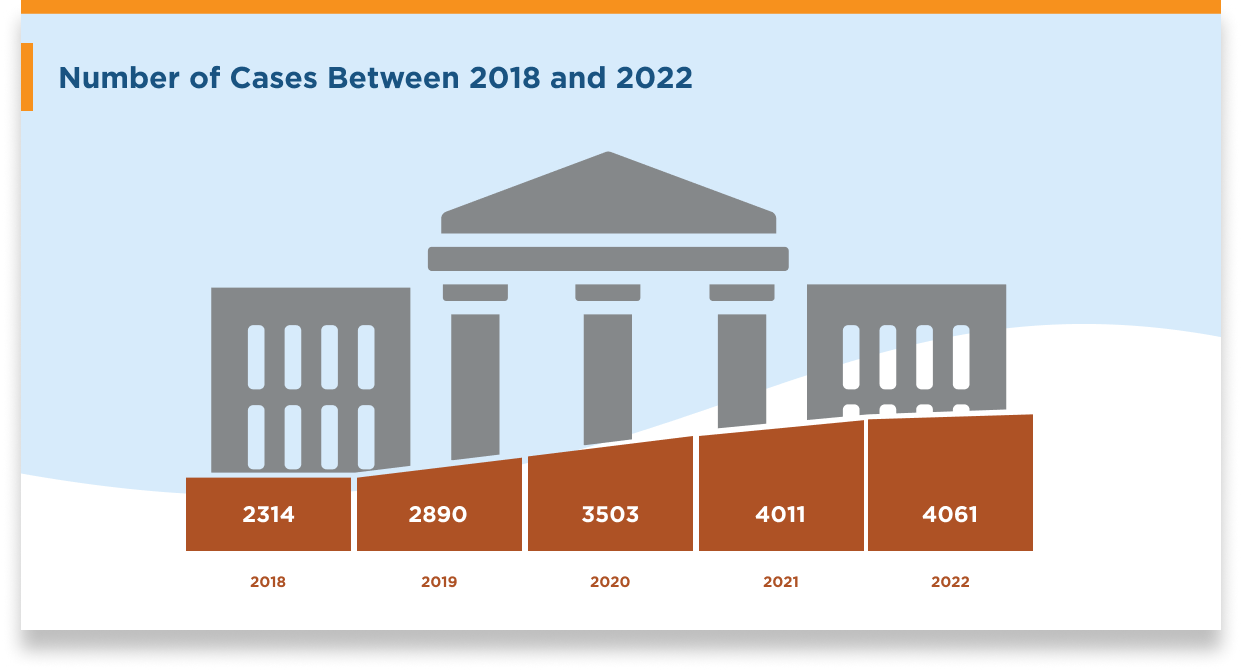For companies selling consumer goods online in 2023, digital accessibility on your app, desktop, and mobile website is essential for all your customers to order from you. In addition, a strong website accessibility initiative can protect you from costly ADA-based surfing lawsuits.
In January, UsableNet hosted Jennifer Rusie, Partner at Jackson Lewis, for an exclusive webinar on our 2022 end-of-year ADA lawsuit report findings. The Q&A from that webinar inspired our eight facts your e-commerce company should know about ADA web accessibility in 2023.
Keep reading, or if you prefer, follow the link to watch the webinar "The State of ADA App and Web Lawsuits in 2023" on demand now.

1) 2022 was a record-breaking year.
Last year, 77% of the 4,061 digital accessibility lawsuits were against e-commerce companies.
2) Many big companies have been sued for web accessibility- at least once.
Almost 20% of the top 500 e-commerce websites received a lawsuit in 2022. For the big e-commerce players, web accessibility has been on the radar for a while. Over the last five years, almost 80% (78%) of the top 500 e-commerce websites received a lawsuit.
3) Settling with one plaintiff doesn't protect you from suits on your app or other e-commerce sites.
19%, i.e., nearly 600 lawsuits in 2022, were against companies that have received a previous ADA Digital Lawsuit. For e-commerce companies, we commonly see a company with various brands or sites sued separately under each brand. You may also be sued first for your desktop site and then for the mobile site or app.
4) No e-commerce company is too small to receive a lawsuit.
You can be a sole proprietor and still get a lawsuit under title III of the ADA. If you sell goods online in 2023, you risk receiving an ADA-based suit if your website is not accessible to people with disabilities.
5) Plaintiffs will likely file a case in New York, Florida, or California.
Suppose your company sells and delivers products to customers in New York, and you are in Kentucky. In that case, a New York-based customer can still file an ADA web accessibility case against you in New York. Why New York? In 2022, plaintiffs consistently filed the most ADA web accessibility lawsuits in New York, followed by California and Florida. The courts and judges in these districts are familiar with ADA web accessibility cases, and most have historically tended to be sympathetic to the plaintiffs.
6) The plaintiff in an ADA web accessibility lawsuit will likely have a visual disability.
Most of the more than 4,000 ADA web accessibility lawsuits filed in 2022 and the nearly 16,000 ADA web accessibility lawsuits filed in the last five years had plaintiffs with visual disabilities. Plaintiffs with visual disabilities filed the most cases, and plaintiffs with auditory disabilities came in second; most often, claims filed by people with hearing disabilities focused on digital accessibility issues for video, such as a lack of captions or missing audio descriptions.
7) Your website accessibility lawsuit may list a lack of accessibility statement.
In addition to listing website barriers, a typical claim for ADA web accessibility is likely to cite an absence of a web accessibility statement. For the same reason, having an accessibility statement may decrease your chances of getting an ADA claim.
Your accessibility statement should not be a laundry list of web accessibility issues on the site. Instead, keep your statement high-level.
More than anything else, an accessibility statement should tell your customers that you care about accessibility. Be sure to include how your customers can contact you if they have accessibility issues, and make sure the customer service person on your end of the line is ready and trained to help.
In 2023, prioritize web accessibility if you have an e-commerce website
No industry has felt the brunt of ADA lawsuits for website accessibility more than e-commerce companies. Yet, your efforts toward web accessibility, even if prompted by the litigation landscape, can positively impact your company and help you deliver a better experience for many of your customers.
For example, in the US, 1 in 4 people have a disability, and not just people with disabilities benefit from an accessible and usable e-commerce website. In addition, people with limited or low vision, cognitive disabilities, non-native speakers, temporary or environmental disabilities, and the elderly can more easily use an accessible website.
This blog primarily focuses on findings from lawsuits filed under title III of the ADA in federal and state court. In our end-of-year report, you can read more of our results from the more than 4,000 lawsuits filed in 2022.








